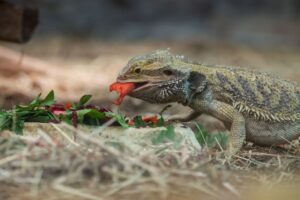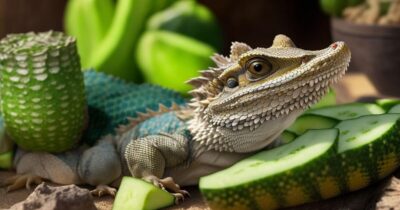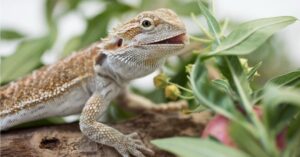Curiosity about the dietary needs of our scaly companions, particularly bearded dragons, is a testament to our dedication to their well-being. Among the crucial components of their nutrition are fruits and vegetables, offering essential vitamins and minerals. So, what fruits and vegetables can bearded dragons eat?
Bearded dragons can safely consume a variety of fruits and vegetables, including leafy greens, squash, bell peppers, berries, apples, mangoes, papayas, melons, carrots, and zucchini.
Understanding this is pivotal for their health and vitality. These fascinating reptiles, known for their distinctive appearance and gentle demeanor, require a balanced diet rich in nutrients to thrive in captivity. Let’s delve into the realm of reptilian nutrition and uncover the diverse array of plant-based options that can enrich the diet of these beloved pets.
Safe Fruits for Bearded Dragons

Bearded dragons can enjoy a variety of fruits as part of their diet, but it’s important to offer them in moderation and ensure they are safe and suitable for their digestive systems. Here’s a list of safe fruits for bearded dragons along with explanations:
- Apples: Bearded dragons can eat apples, but they should be fed in moderation due to their high sugar content. Make sure to remove the seeds and core as they can be a choking hazard.
- Blueberries: These are safe for bearded dragons and can be offered as a treat. They are low in oxalates, which can be harmful in large amounts.
- Strawberries: Bearded dragons can eat strawberries occasionally. They are rich in vitamin C and fiber, but should also be given in moderation due to their sugar content.
- Grapes: Grapes are safe for bearded dragons, but they should be fed sparingly due to their high sugar content. Make sure to cut them into small pieces to prevent choking.
- Bananas: Bearded dragons can eat bananas, but they should be given infrequently due to their high sugar content. They are also high in phosphorus, so moderation is key.
- Pears: Pears are safe for bearded dragons and can be offered as an occasional treat. Remove the seeds and skin before feeding.
- Kiwi: Kiwi is safe for bearded dragons and can provide them with vitamin C. Feed it in moderation due to its acidity.
- Papaya: Bearded dragons can eat papaya in moderation. It’s rich in vitamins and minerals, but too much can cause digestive upset due to its enzyme content.
- Melon (e.g., cantaloupe, honeydew): These fruits are safe for bearded dragons and can provide hydration. Feed them in moderation due to their sugar content.
- Raspberries and Blackberries: Both raspberries and blackberries are safe for bearded dragons and can be given as occasional treats. They are low in oxalates and provide vitamins and antioxidants.
When offering fruits to your bearded dragon, always ensure they are washed thoroughly to remove any pesticides or contaminants. Additionally, fruits should only make up a small portion of their diet, with the majority consisting of leafy greens and vegetables. Monitor your bearded dragon for any signs of digestive issues or allergic reactions when introducing new foods.


